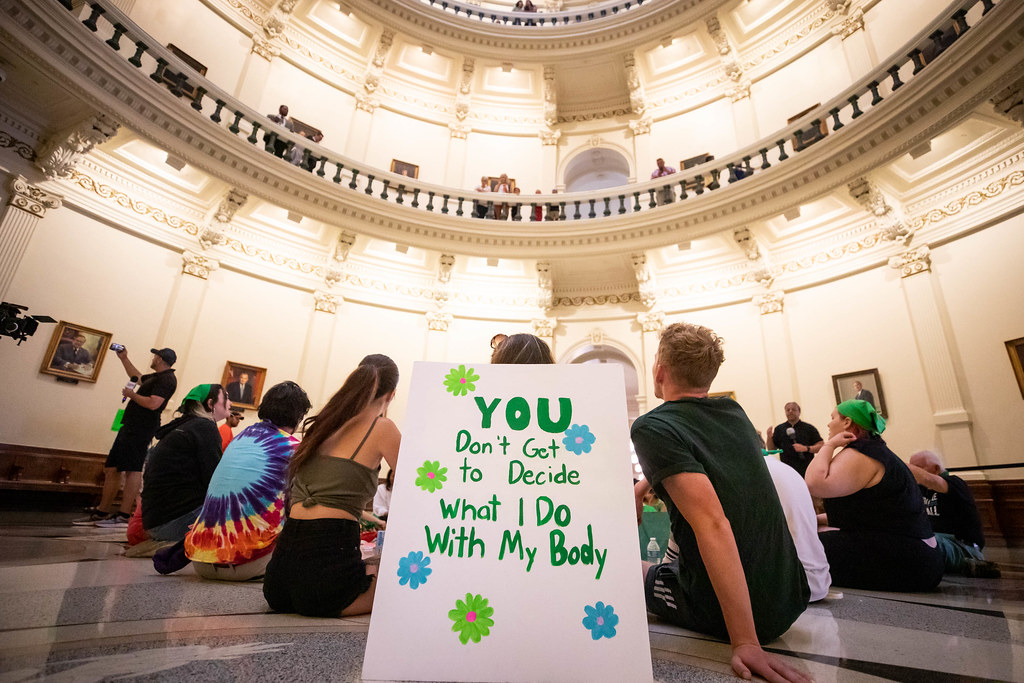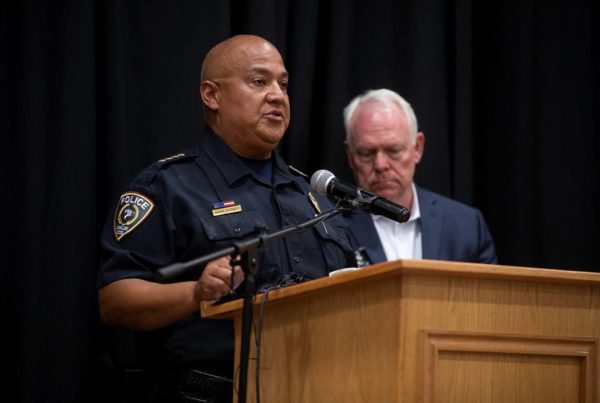Although abortions after six weeks have effectively been banned in Texas since last fall as a result of SB8, a new near-total abortion ban becomes the law on Thursday when House Bill 1280 officially goes into effect – a law triggered by the Supreme Court’s decision overturning Roe v. Wade.
On Tuesday, reproductive rights groups filed a federal class-action lawsuit against Texas Attorney General Ken Paxton, with an objective of preventing state officials from prosecuting people helping Texans gain access to legal abortions in other states.
Joanna Grossman – the Ellen K. Solender Endowed Chair in Women and the Law and professor of law at Southern Methodist University in Dallas – joined Texas Standard to help explain the new law taking effect tomorrow as well as why reproductive rights groups are filing this action and what their prospects look like.
This transcript has been edited lightly for clarity:
Texas Standard: Texas’ so-called trigger law takes effect on Thursday. Can you say a little bit more about HB 1280, what it actually does and how it’s different from current abortion law in Texas?
Joanna Grossman: Sure. The trigger law is, as you mentioned, basically a complete abortion ban. So SB 8 has effectively ended abortions after the sixth week of gestation, but 1280 has no gestational age. So there’s no point in pregnancy at which abortion is legal. The only exception is if the pregnancy or the birth is going to threaten the life of the person who’s pregnant or cause a major risk of substantial bodily impairment. So effectively, all abortions are illegal again, unless there’s an extreme emergency.
What are the practical implications for those seeking abortions? Could they be criminally prosecuted?
So for people seeking abortions, it is still not a crime in Texas, even under the trigger law, for a person to induce their own abortion, or what we call self-managed abortion. But it is a felony for anyone else to perform the procedure or provide the pills for the abortion or to cause the abortion. All the abortion clinics have closed in Texas already. And effectively what this means is the only people who could get legal abortions will get them in emergency rooms, and only after the doctor and hospital have decided that an emergency that qualifies for the exception has occurred.
» MORE: Federal judge in Texas blocks Biden from protecting certain abortion providers
What about someone who wants to travel to another state where abortions are legal? Could you tell us a little bit more about the lawsuit that was filed by reproductive rights groups on Tuesday?
A lot of people in Texas who want abortion and do not qualify for the medical emergency exception, or at least not yet, have been seeking care out of state. But the GOP legislators and some of the other folks behind the ban have been threatening anyone who helps them. So they’ve been sending cease and desist letters and other forms of communications to basically say to people who pay for abortions, to people who arrange travel, to people who provide even truthful information about the availability of out-of-state abortion, that all of those people and all of those actions are complicit in murder, as they say, and that they will also be prosecuted.
So what these groups are doing with this lawsuit is to try to seek a court order that clarifies that, first of all, there’s nothing wrong with leaving the state to go get an abortion if it’s legal in the other state, and that people, in fact, have a constitutional right to travel, and that groups in Texas are doing nothing wrong by providing information, providing financial support or providing logistical support for that process. But because of the threats, they need the protection of a court order.
Let’s be clear about who the plaintiffs and defendants are here. And has the court accepted the case? Is it going forward now?
The case has been filed, and so it will go forward. The plaintiffs are abortion funds, so groups that provide money to pay for abortions and sometimes money for travel or other expenses associated with abortion. And also some groups that help arrange travel that don’t necessarily pay for it. The defendants are the attorney general and the district attorneys across the state.
» MORE: How Mexico’s expansion of abortion access is becoming a lifeline for Texans seeking an abortion
Has the attorney general threatened to take legal action against those who provide information about obtaining abortion-inducing medication or seeking care outside of Texas?
Yes, the attorney general has had many communications with local prosecutors through these sort of announcements he’s made in which he has said you should be going after not only abortion providers, but also anyone who assists in these various ways. So the attorney general has made pretty clear that he wants prosecutors to take this very aggressive interpretation of the law. And then the GOP legislators and some of these other folks involved have doubled down on that and sent direct communications and threats to individual groups telling them, you are violating the law and we’re going to make sure that you get prosecuted.
HB 1280 become state law at midnight tonight. Any sense of timing with this legal action?
I mean, ideally, there would be consideration of a TRO immediately, possibly even today. So there could be a temporary restraining order that then gets lifted by an appellate court. I mean, there could be a lot of ups and downs along the way, but I think the hope of the groups that filed the lawsuit is that they would have some kind of protection – even if it’s only temporary – in place as 1280 becomes the law.















